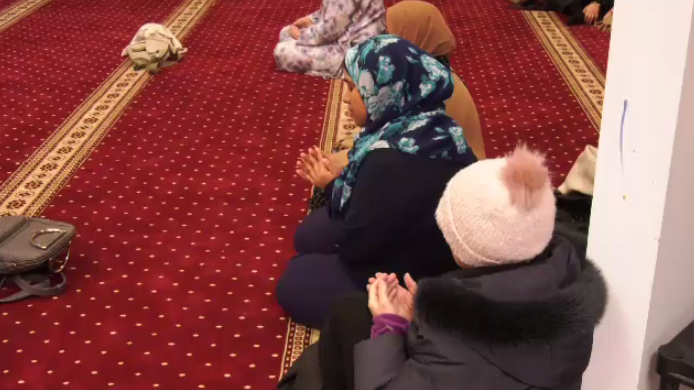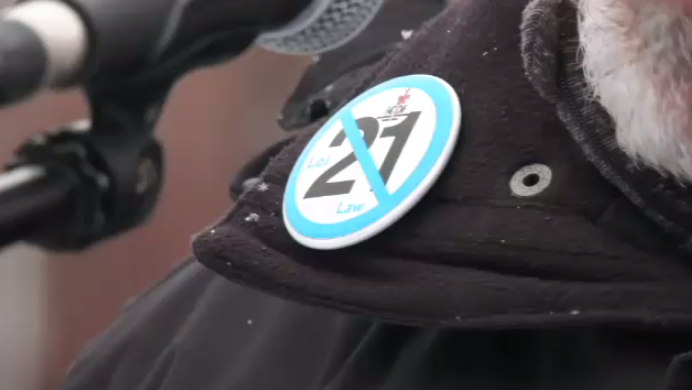'The sorrow doesn't go away:' Commemoration for victims of Quebec City mosque shooting
Montrealers gathered Friday to commemorate victims of the Quebec City mosque shooting nearly six years ago.
Afternoon prayers at the Verdun Islamic Centre also included a moment of reflection for those killed in the 2017 attack.
"Believe me, the sorrow doesn't go away. Yes, we life our live and this is nature. But the sorry is in our hearts everyday," said Samer Mazjoub, president of the Canadian Muslim Forum.
On Jan. 29, 2017, six men were killed and five critically injured shortly after evening prayer at the Quebec City Islamic Cultural Centre.
The victims were professor Khaled Belkacemi, 60; pharmacy worker Aboubaker Thabti, 44; grocery store owner Azzeddine Soufiane, 57, the owner of a local grocery store; accounting technician Mamadou Tanou Barry, 42; computer analyst Abdelkrim Hassane, 41; and IT worker Ibrahima Barry, 39.
The gunman, who was 27 at the time, pleaded guilty to the murders in 2018.
The shooter told police he felt compelled to act for fear that immigrants would kill his family, and told psychiatric evaluators he "wanted glory."
A judge said the shooter had a "visceral hatred for immigrants who are Muslims."
 Afternoon prayers at the Verdun Islamic Centre on Jan. 27, 2023 included a moment of silence for those killed in the 2017 Quebec City mosque shooting. (CTV News/Kelly Greig)
Afternoon prayers at the Verdun Islamic Centre on Jan. 27, 2023 included a moment of silence for those killed in the 2017 Quebec City mosque shooting. (CTV News/Kelly Greig)
For Ahmed Chihane, president of the Verdun Islamic Centre, the tragedy is a painful reminder of the reality many Quebec Muslims face.
"[It's] the problem of Islamaphobia here in Quebec, which is rising every day," he said.
According to Montreal police, the number of hate incidents based on religion rose from 32 to 40 between 2020 and 2021.
And in Quebec City, the number of hate crimes rose for the fourth year in a row.
"This might happen to any one of us," Chihane concluded.
For this reason, Friday's event was more than a commemoration -- it was a call to action.
"Bringing everyone here in front of the mosque to talk about the actions we can do to counter Islamophobia is really important," said Stephen Brown, CEO of the National Council of Canadian Muslims.
Those actions include addressing racial profiling by authorities like police, and creating better tools to help people report intimidation or hate crimes.
According to Brown, many are also hoping for changes to Quebec's secularism law, Bill 21.
 A speaker wears an anti-Bill 21 pin at a Montreal commemoration on Jan. 27, 2023 for victims of the 2017 Quebec City mosque shooting. (CTV News/Kelly Greig)
A speaker wears an anti-Bill 21 pin at a Montreal commemoration on Jan. 27, 2023 for victims of the 2017 Quebec City mosque shooting. (CTV News/Kelly Greig)
"A major source of public tension right now is Bill 21," said Brown. "In a situation where it allows you to take people's rights without justifications means we don't have rights, we have permissions."
Bill 21 prohibits government employees from wearing religious symbols, including head and face coverings.
Many religious groups and civil rights advocates have argued the bill disproportionately affects racialized and immigrant groups, particularly Muslim women.
But the Quebec government has maintained that the law is "reasonable."
Quebec Premier Francois Legault has also denied claims that Islamaphobia is an issue in Quebec.
However, many members of the Muslim community feel differently.
"We should not beg for tolerance and acceptance," said Mazjoub of the Canadian Muslim Forum. "We are citizens. To make a whole community feel like they need to beg for tolerance and acceptance is extremely bad."
CTVNews.ca Top Stories

BREAKING Iran fires air defence batteries in provinces as sound of explosions heard near Isfahan
Iran fired air defence batteries early Friday morning after reports of explosions near the city of Isfahan, the state-run IRNA news agency reported.
American millionaire Jonathan Lehrer denied bail after being charged with killing Canadian couple
American millionaire Jonathan Lehrer, one of two men charged in the killings of a Canadian couple in Dominica, has been denied bail.
Nearly half of China's major cities are sinking, researchers say
Nearly half of China's major cities are suffering 'moderate to severe' levels of subsidence, putting millions at risk of flooding especially as sea levels rise.
Prince Harry formally confirms he is now a U.S. resident
Prince Harry, the son of King Charles III and fifth in line to the British throne, has formally confirmed he is now a U.S. resident.
Judge says 'no evidence fully supports' murder case against Umar Zameer as jury starts deliberations
The judge presiding over the trial of a man accused of fatally running over a Toronto police officer is telling jurors the possible verdicts they may reach based on the evidence in the case.
Health Canada to change sperm donor screening rules for men who have sex with men
Health Canada will change its longstanding policy restricting gay and bisexual men from donating to sperm banks in Canada, CTV News has learned. The federal health agency has adopted a revised directive removing the ban on gay, bisexual and other men who have sex with men, effective May 8.
Colin Jost names one celebrity who is great at hosting 'Saturday Night Live'
Colin Jost, who co-anchors Saturday Night Live's 'Weekend Update,' revealed who he thinks is one of the best hosts on the show.
Sports columnist apologizes for 'oafish' comments directed at Caitlin Clark. The controversy isn't over
A male columnist has apologized for a cringeworthy moment during former University of Iowa superstar and college basketball's highest scorer Caitlin Clark's first news conference as an Indiana Fever player.
'Shopaholic' author Sophie Kinsella reveals brain cancer diagnosis
Sophie Kinsella, the best-selling author behind the 'Shopaholic' book series, has revealed that she is receiving treatment for brain cancer.
































